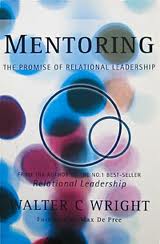 (The following are reflections based on Walter C. Wright’s book, Mentoring: The Promise of Relational Leadership.)
(The following are reflections based on Walter C. Wright’s book, Mentoring: The Promise of Relational Leadership.)
Want to start or enhance a mentoring relationship? Are you interested in having a relationship with someone who might serve as a mentor?
Are you already a mentor to one or more persons but you are not sure how to make the most of such a relationship?
Would you find it helpful to hear what questions have been particularly useful to a mentor?
Then, read Mentoring: The Promise of Relational Leadership by Walter C. Wright. Wright is a Senior Fellow of the De Pree Leadership Center at Fuller Theological Seminary. He is the former president of Regent College in Vancouver, British Columbia. Wright not only has much experience in mentoring others but also has experienced good mentors as well in longtime pastor Donald Bubna and Max De Pree.
Even in the foreword of the book, written by Max De Pree, there is much help for any mentor or mentoree.
Why read this book?
Get help in clarifying the purpose of mentoring.
Mentoring is a strategy for leadership development or for personal leadership renewal. “Mentors encourage leaders to reflect on who they are (pace), what is important (journey), and how they are shaping the culture of their organization (relationships)” (p. xxix).
This is critical. I suspect that many mentors/mentorees would be helped by getting a clear sense of purpose about what they are trying to do in this process. The effectiveness of many mentoring relationships could be shaped by clarifying the purpose and goals for such a relationship.
Get help in “knowing the basic questions that define reality in relational leaderships.”
Wright originally learned in the process of working with one of his own mentors, Max De Pree, some important questions:
- Who are you? (What shapes you? To what are you committed?)
- Who cares? (To whom are you committed? What are you reinforcing?)
- What legacy are you leaving? (What are you building? What do you measure?)
Wright developed each question further with other invaluable quotes related to each one of these.
Get help in knowing how to be transparent as a mentor.
“Mentors open their hearts and minds to share themselves” (p. 36). Wright speaks of how one of his own mentors shared his hopes, dreams, and visions.
Get help in knowing what to look for as you consider a possible mentor.
In two chapters in particular (“Choice” and “Relationships”), there is extensive discussion on what a mentor does and what to look for in a mentor. Wright includes a list of fifteen questions that one might consider when looking for a mentor (p. 70). These include such questions as:
- Why do you respect this person and the life, leadership, and wisdom he models?
- How accurate is her understanding of her own journey?
- Who have been his mentors?
- When does he listen and when does he talk?
- How is her strength of character revealed in her values and integrity?
Get help in learning how to be a mentor or a mentoree.
Wright gives twenty practical suggestions for anyone involved in the mentoring process (pp. 73-82). Some of these include:
- Come to the meeting with questions
- Invite the person to ask questions that draw you out
- Listen, assess, act, and give feedback
- Find opportunities to affirm lavishly this person’s contribution
- Ask questions rather than give advice
Jim, thanks for all the tips!
Thanks Margaret! I continue to follow what you are doing with Wonderstruck!